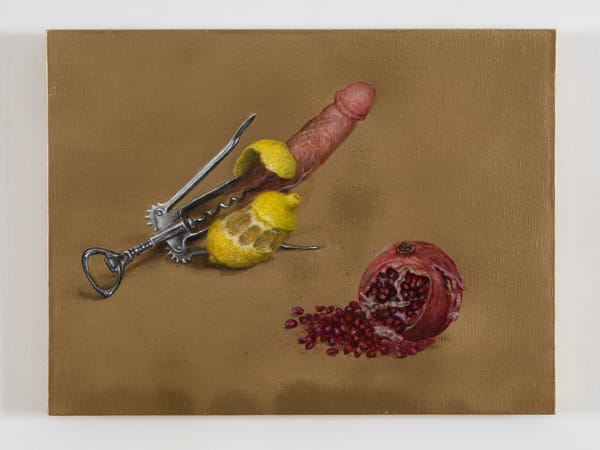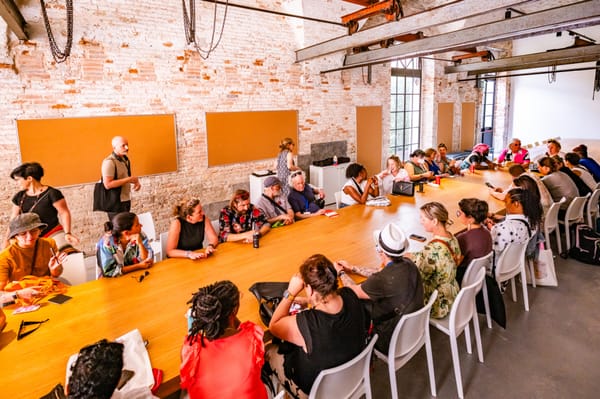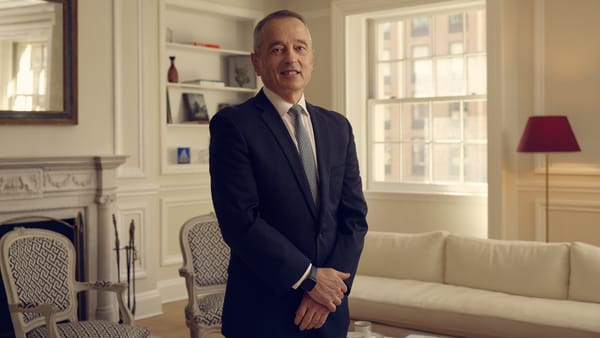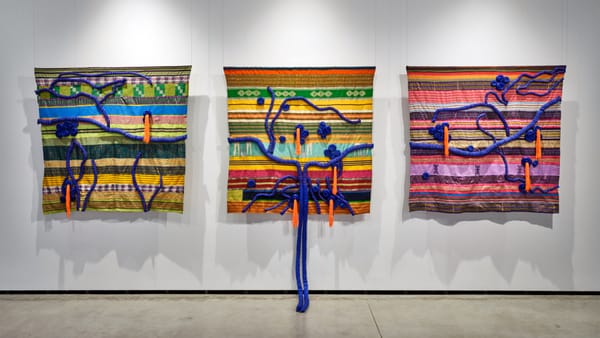From Melbourne with Love
Founded by conductor/saxophone whiz Andy Williamson, the Bombay Royale are eleven Australian troublemakers who play their own hammy, modernized style of Bollywood movie music.

A high, piercing riff is twice ripped out of a harsh electric guitar before an intense blast of bass jumps out from underneath. Then the drums come in, supported by thick drone. A balmy-voiced male singer begins to purr as the melody is played on a lower stringed acoustic; a female voice briefly takes over as another faux-ominous trombone figure emerges; the two singers keep trading off verses until an even more theatrical procession of strings and horn erupts, swooping down with all the extravagant fire of a veritable disco orchestra. This all repeats itself once, with extra synthesized violins and camped-up saxophone interrupting every now and again to make some histrionic point, before ending abruptly on the same piercing guitar it started with. Three minutes have passed. The song is called “Ankhiyan.” It opens the Bombay Royale’s second album, The Island of Dr Electrico. What fun.
Founded by conductor/saxophone whiz Andy Williamson, the Bombay Royale are eleven Australian troublemakers who play their own hammy, modernized style of Bollywood movie music. Each band member has given himself or herself a ridiculous spy-thriller alias, like “The Jewel Thief” (Josh Bennett, their multi-instrumentalist on sitar and tabla) and “The Kungfu Dentist” (Ros Jones, their trombone player). Visually, they dress up in outrageous costumes, including one orange tunic, one sailor’s cap, and several Zorro masks. On record, they flavor their gloriously schlocky Indian cabaret-pop with blazing guitar fury, sizzling ribbons of synthesizer, bizarre tape effects, smooth disco violins that evoke a leisure lounge and breathe rah-rah-Rasputin, one particularly ominous loop of a stock villain cackling over and over again, and a full brass ensemble. They released their debut album You Me Bullets Love in 2012 and their excellent follow-up The Island of Dr Electrico this July on the Melbourne label Hope Street. At first, The Island of Dr Electrico sounds like a brilliantly thought-through parody of pseudo-Oriental exoticism, of Harrison Ford riding elephants, of Roger Moore sneaking around sumptuous palaces, of every sitar ever awkwardly dropped into a pop song. Play the record twice, however, and you’ll realize that not only was this an actual style of music with close ties to the Indian film industry in the ‘70s, but that the band has fully inhabited it to the best of their ability. Compared to Asha Bhosle, say, the Bollywood playback vocalist who apparently sang over 12,000 songs for actual actresses to lip-sync on screen, the Bombay Royale exaggerate the genre’s kitschy side, an inevitable result of their goofy irony. But that just makes them more intense.
After “Ankhiyan” starts the album with a bang, The Island of Dr Electrico sashays into even gaudier territory. Lead singers Parvyn Kaur Singh (“The Lady”) and Shourov Bhattacharnya (“The Tiger”) seductively eye each other from opposite ends of the microphone, alternating verses and occasionally chiming in together. One slinky dance groove follows another in an expertly paced sequence of flash and glamour, passing through the eerie “Hooghly Night Patrol” and its magnificent horn parade, into the jittery “(Give Me Back My) Bunty Bunty,” wherein a spiraling, glittery keyboard hook gives way to one of the few English lyrics on the record: Singh croons “Give me back my bunty bunty,” whatever that means, then Bhattacharnya blurts out “I don’t have your bunty bunty.” and so goes the call and response until that high keyboard trill starts sputtering again. “Gyara 59” provides a brief lull with steady, syncopated tabla, and then the whole album explodes with “The Bombay Twist.” First you hear a clip of maniacal laughter slowly fading out as the central riff crawls in on sitar, and the drums slam down all at once out of the blue and the trumpets suddenly kick off, circling around and around the same basic melody. A glassy, psychedelic synthesizer pokes its head in from underneath, and a deep, grand voice who might be Bhattacharnya or somebody else entirely proclaims, “Is it just me, or is it… hot in here?!” and then the horns go crazy, triggering further warped snippets of dialogue that end in the yelled command “Do the twist like this!” The sitar comes to the foreground and noodles around for a while, sampled childish giggles begin to echo throughout the mix, another flock of disco violins drench everything in a hot wave of light, and a dilruba harp starts to moan. The beat stops and for a few seconds you hear nothing but absolute silence. Finally, one of those corny downward sitar arpeggios is slowly strummed. Somebody sneers, mustering as much contempt as he can: “Why are you driving the taxi?” Then the beat blasts back up again for one last climax as you look around, head spinning, desperately trying to grab ahold of this sweaty, slippery music before it leaves you in the dust.

There are moments like that all over The Island of Dr Electrico, the rare album whose illusion of glamour holds up with repeated listening. The music is so hard and hooky, so dense with snarling guitar licks and sly asides on brass, that the whole package retains an obsessive, ominous power long after the novelty wears off, and if the celebration of erotic melodrama gets a little silly, both Singh and Bhattacharnya convey real erotic passion, cooing and growling and winking at each other. Upbeat rockers like “Wild Stallion Mountain” and “(Give Me Back My) Bunty Bunty” smolder with voluptuously stylized energy, oddball jams like “Falcon’s Landing” and “The Bombay Twist” itself get carried away on sheer delight, and even the heartsongs pack a certain sensual thrill. Seductive, sinister, glitzy, tacky, elegant, decadent, hallucinatory, breakneck, exhausting, the band slams down the beat with tremendous musical force. Although aesthetic distance is a key factor and probably the defining one in such a specific formal project, you couldn’t really call what they do deconstruction; they add too many other elements to the synthesis, too many dazzling strings and sinuous funk rhythms on top of their Bollywood cabaret. But nevertheless the record functions as a crazed, adoring love letter to a style of music whose distant heyday and gleeful vulgarity make it ripe for tribute. Whether or not the style has any bearing on today’s pop landscape is irrelevant. What matters is that they’ve rejuvenated it and made it their own, that their enthusiasm for high kitsch magically morphs into the performed enthusiasm the kitsch itself consists of, that they make said enthusiasm scary and exciting and musically irresistible. If only all postmodern genre exercises were this committed, this hedonistic.
The last song on the album is called “The River.” It’s a tense, weird crawler of a ballad, the only other song besides “(Give My Back My) Bunty Bunty” and “The Bombay Twist” with English lyrics. It starts with one of the band’s signature riffs, unaccompanied and slow. “The river runs to you,” Singh calls out longingly in a sweet yet sharp, pungent yet lyrical whimper. Low shades of brass slowly begin to add color and then suddenly yelp the hook as staccato chunks of percussion quietly slide in. Bhattacharnya drones a verse with similarly natural/metaphysical lyrics over the same tangy guitar riff, and then the two singers join in a final harmony to sing the chorus. A synthesizer shoots an arrow through the musical center and hisses a fierce solo. Then the song starts over, and a fat, distorted keyboard bass takes over the main melody. Singh starts wailing again before the two singers unite once more for the eerie chorus, this time with keyboard commentary echoing off the walls. Finally, the instruments begin to shudder. The rhythms become irregular and halting. Everything breaks down into static and feedback. You hear the song slowly fragment into little bits. You hear one last screech, and then it’s gone.
The Island of Dr Electro and You Me Bullets Love are available from Amazon and other retailers.





